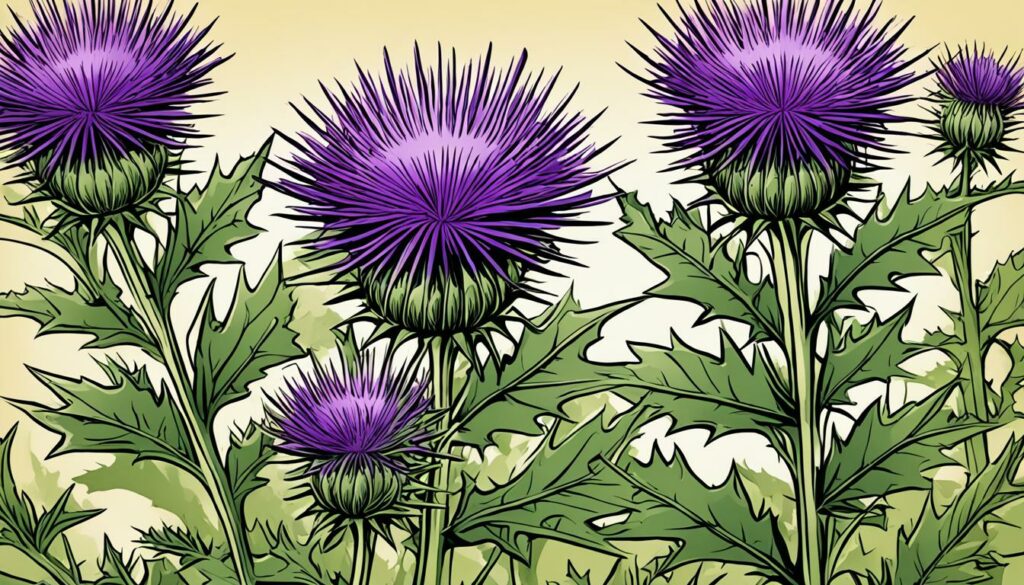Welcome to our article on milk thistle, a powerful herb known for its numerous benefits for liver health. In this guide, we will explore the various uses and advantages of milk thistle, as well as its role in supporting natural liver detoxification and overall liver health.
Firstly, let’s discuss the uses of milk thistle. This herbal remedy, also known as silymarin, has been used for centuries to promote liver health. Its antioxidant and anti-inflammatory properties make it a valuable tool in protecting liver cells and aiding in cell repair.
Studies have shown that milk thistle may be beneficial in easing inflammation and symptoms of liver diseases such as jaundice, cirrhosis, liver cancer, and fatty liver disease. However, its effectiveness against viral liver infections like hepatitis C is still inconclusive.
Another important use of milk thistle is its effectiveness in treating certain types of mushroom poisoning. It has been found to be a life-saving treatment for toxic mushroom ingestion.
When it comes to safety, milk thistle is generally safe to take in recommended doses. However, some mild side effects such as nausea, gas, or loss of appetite may occur. It is always best to consult with a healthcare professional before taking milk thistle or any other herbal supplement.
In conclusion, milk thistle is a valuable herbal remedy for liver health. Its powerful antioxidant and anti-inflammatory properties make it a popular choice for natural liver detoxification and support. However, it is important to consult with a healthcare professional and use milk thistle as a complementary therapy, rather than a substitute for medical treatment.
What is Milk Thistle?
Milk thistle, scientifically known as Silybum marianum, is a plant native to Europe’s Mediterranean region. It is characterized by its long, thin stem, spiny leaves, and purplish-pink thistle at the top. Milk thistle gets its name from the white lines that streak across its green leaves, and when the leaves are crushed or ripped, a milky white liquid oozes out. The main component of milk thistle is silymarin, which is known for its antioxidant and anti-inflammatory properties. Silymarin is often used interchangeably with milk thistle, although they are not exactly the same thing. Milk thistle is commonly consumed in the form of powder, capsules, pills, or liquid extracts.

Milk thistle has been used for centuries as a herbal remedy, primarily for its potential benefits in supporting liver health. Its active compound, silymarin, is believed to provide several health advantages, including protection against toxins and oxidative stress. In addition to its liver-protective effects, milk thistle has been studied for its potential benefits in brain function, bone health, cancer treatment, breast milk production, acne, and blood sugar control in people with type 2 diabetes. However, further research is needed to confirm these effects and determine the optimal dosage and treatment duration.
Overall, milk thistle is a versatile herbal remedy with promising potential. However, it is essential to consult with a healthcare professional before adding milk thistle to your wellness routine, especially if you have any pre-existing medical conditions or are taking other medications. Remember, milk thistle should be used as a complementary therapy and is not a substitute for medical treatment or professional advice.
Milk Thistle and Liver Health
Milk thistle is widely recognized for its remarkable effects on supporting liver health. Clinical studies have demonstrated that silymarin, the active compound found in milk thistle, possesses the ability to shield liver cells against toxins and oxidative stress, while also reducing inflammation within the liver. Consequently, it can provide relief from symptoms associated with various liver conditions, such as jaundice, cirrhosis, liver cancer, and fatty liver disease. By impeding toxins from binding to liver cells and neutralizing harmful free radicals, silymarin is believed to exert its protective mechanisms. Nevertheless, further research is necessary to determine the ideal dosage and duration of treatment tailored to specific liver conditions. It is essential to bear in mind that milk thistle does not serve as a cure for liver diseases and should be employed as a complementary therapy under the guidance of a healthcare professional.
“The liver is the body’s filter, and milk thistle helps keep it functioning at its best.”
When it comes to maintaining liver health, milk thistle offers significant advantages. Its remarkable properties contribute to liver cell protection, reducing inflammation, and supporting overall liver function. Although it is not a standalone cure, milk thistle can be a valuable addition to a comprehensive approach to liver health.

Benefits of Milk Thistle for Liver Health
| Benefits | Description |
|---|---|
| Protects Liver Cells | Silymarin shields liver cells from toxins and oxidative stress. |
| Reduces Inflammation | Inflammatory response in the liver is minimized with the help of milk thistle. |
| Alleviates Symptoms | Milk thistle can provide relief from symptoms associated with liver diseases like jaundice, cirrhosis, liver cancer, and fatty liver disease. |
| Neutralizes Harmful Free Radicals | By neutralizing free radicals, milk thistle protects liver cells from damage. |
Together with its potential to reduce inflammation, promote liver cell protection, and alleviate symptoms, milk thistle is a valuable natural remedy for enhancing liver health. However, it is crucial to consult a healthcare professional to determine if milk thistle is suitable for your specific liver condition and to ensure you are using the appropriate dosage.
Other Potential Benefits of Milk Thistle
In addition to its liver-protective effects, milk thistle offers a range of potential benefits in various other health conditions. Research suggests that milk thistle may support brain health by reducing oxidative stress, potentially preventing age-related decline in brain function. It has also been found to stimulate bone mineralization, making it a potential ally in preventing or delaying bone loss.
Milk thistle shows promise in fighting against cancer when used in combination with conventional treatments. Studies have indicated that it may have anticancer effects, although further research is needed to validate these findings.
Lactating women may find milk thistle beneficial, as it has been shown to increase breast milk production. This could be particularly valuable for nursing mothers seeking additional support.
Inflammatory skin conditions such as acne may also benefit from milk thistle, thanks to its ability to reduce inflammation and oxidative stress. Incorporating milk thistle into your skincare routine may help combat acne and promote healthier skin.
Moreover, milk thistle may have a positive impact on blood sugar control in individuals with type 2 diabetes. Its potential to lower blood sugar levels warrants further investigation as a potential complementary treatment for this condition.
While these potential benefits hold promise, it is essential to note that further research is necessary to confirm their efficacy. Optimal dosages and treatment durations also need to be established for each specific condition. As always, it is important to consult with a healthcare professional before embarking on any new herbal remedy regimen to ensure safety and suitability to your individual needs.

| Potential Benefits | Description |
|---|---|
| Brain Health | Reduces oxidative stress in the brain and may prevent age-related decline in brain function |
| Bone Health | Stimulates bone mineralization, potentially preventing or delaying bone loss |
| Anticancer Effects | May have potential in fighting against cancer, especially when used alongside conventional treatments |
| Breast Milk Production | Shown to increase breast milk production in lactating women |
| Acne Support | Reduces inflammation and oxidative stress, potentially helping to improve acne |
| Blood Sugar Control | May help lower blood sugar levels in individuals with type 2 diabetes |
Safety and Side Effects of Milk Thistle
When it comes to taking milk thistle, safety is a top concern. Thankfully, milk thistle is generally considered safe when taken in recommended doses. However, it’s important to be aware of the potential side effects and precautions associated with this herbal remedy.
Some individuals may experience mild side effects when taking milk thistle, including nausea, gas, diarrhea, or loss of appetite. These side effects are typically temporary and subside on their own.
It’s worth noting that milk thistle belongs to the Asteraceae/Compositae family, which includes other plants such as ragweed and daisies. If you have allergies to these plants, you may also be allergic to milk thistle. Allergic reactions can range from mild to severe, so it’s essential to be cautious if you have known allergies.
For individuals with diabetes, it’s important to exercise caution when taking milk thistle. This herb may lower blood sugar levels, which can be problematic for those who are already managing their blood sugar. Consulting with a healthcare professional is advisable in such cases to ensure proper monitoring and dose adjustments.
Pregnant or breastfeeding women should also consult with a healthcare professional before incorporating milk thistle or any herbal supplement into their routine. Although milk thistle is generally considered safe for most individuals, it’s essential to take extra precautions during pregnancy and while breastfeeding to ensure the well-being of both the mother and the baby.
Furthermore, milk thistle may interact with certain medications such as anticoagulants, antidiabetic drugs, and some cancer treatments. Therefore, it is crucial to discuss the potential interactions with a healthcare professional before adding milk thistle to your regimen.

“Before adding any supplement to your routine, including milk thistle, it’s always best to consult with a healthcare professional. They can provide personalized recommendations based on your individual health needs and help you navigate any potential interactions or side effects.”
How to Take Milk Thistle
Milk thistle can be taken in various forms, such as powder, capsules, pills, and liquid extracts. It can be consumed as a tea, added to smoothies, or taken with water. The method of administration may vary depending on the specific product you choose and your individual needs.
It is important to follow the recommended dosage instructions provided on the product label. Additionally, consulting with a healthcare professional before starting any new herbal supplement is highly recommended. They can provide personalized recommendations based on your specific health needs.
Milk thistle should be taken as part of a balanced diet and a healthy lifestyle. It is important to note that milk thistle is a complementary therapy and should not be used as a substitute for medical treatment or professional advice.
Recommended Dosage:
The recommended dosage of milk thistle can vary depending on factors such as the product’s potency, concentration, and the severity of the condition being addressed. It is best to consult with a healthcare professional to determine the appropriate dosage for your specific needs.
| Form | Dosage | Frequency |
|---|---|---|
| Powder or capsules | 200-400 mg | 1-3 times daily |
| Liquid extract | 1-2 mL | 2-3 times daily |
| Tea | 1-2 tea bags steeped in hot water | 2-3 times daily |
Remember to always read the product label and follow the dosage instructions provided by the manufacturer. If you are unsure about the appropriate dosage, consult with a healthcare professional for guidance.
Milk thistle should be taken consistently for an extended period to experience its potential benefits.

Considerations and Precautions
While milk thistle is generally safe for most people, it’s important to keep certain considerations and precautions in mind to ensure its optimal use.
Consultation with a Healthcare Professional
Before incorporating milk thistle into your wellness routine, it is crucial to consult with a healthcare professional, especially if you have a pre-existing medical condition or are currently taking other medications. They can provide personalized recommendations based on your specific health needs and guide you on whether milk thistle is a suitable addition to your regimen.
Milk Thistle as a Complementary Therapy
Milk thistle should not be used as a substitute for medical treatment or professional advice. It is essential to understand that while milk thistle may have potential benefits for liver support, natural liver detox, and overall liver health, it should be used as a complementary therapy alongside conventional medical treatment.
Choosing Reputable Sources
When purchasing milk thistle supplements, it is important to select products from reputable sources. Look for supplements that have been tested for purity and potency to ensure their quality and safety. This ensures that you are getting the maximum benefits from the milk thistle.
Monitoring for Side Effects
While milk thistle is generally well-tolerated, some individuals may experience mild side effects such as nausea, gas, diarrhea, or loss of appetite. If you experience any severe or persistent side effects, it is recommended to discontinue the use of milk thistle and seek medical attention.
“Before starting any new herbal supplement, including milk thistle, it is crucial to consult with a healthcare professional. They can provide personalized recommendations based on your individual health needs and help determine if milk thistle is a suitable addition to your wellness routine.” – Dr. Emily Johnson, MD

| Considerations and Precautions | Key Points |
|---|---|
| Consultation with a Healthcare Professional | Before taking milk thistle, especially if you have pre-existing medical conditions or take medications, consult with a healthcare professional to ensure its suitability. |
| Milk Thistle as a Complementary Therapy | Do not replace medical treatment with milk thistle. Use it as a complementary therapy alongside conventional medical advice and treatments. |
| Choosing Reputable Sources | Purchase milk thistle supplements from reliable sources that have been tested for purity and potency. |
| Monitoring for Side Effects | While side effects are rare, monitor for any severe or persistent side effects. Discontinue use and seek medical attention if necessary. |
The Importance of Consultation
Before incorporating any new herbal supplement into your wellness routine, including milk thistle, it is of utmost importance to consult with a healthcare professional. Your healthcare provider is best positioned to provide personalized recommendations based on your individual health needs, ensuring that milk thistle is a suitable addition to your regimen.
A healthcare professional can offer expert guidance on the appropriate dosage of milk thistle, potential interactions with any medications you may be taking, and any precautions or contraindications specific to your health profile. Their expertise will help you make informed decisions and navigate the complexities of integrating milk thistle into your lifestyle.
Remember, seeking professional guidance is always the recommended course of action when it comes to matters of your health. By partnering with a healthcare professional, you can optimize the benefits of milk thistle and ensure that your liver health and overall well-being remain a top priority.

Milk Thistle Consultation Checklist:
- Schedule an appointment with your healthcare provider to discuss the incorporation of milk thistle into your wellness routine.
- Share your medical history and any existing health conditions with your healthcare provider.
- Inform your healthcare provider about any medications or supplements you are currently taking.
- Discuss any potential allergies or sensitivities you may have.
- Seek guidance from your healthcare provider on the appropriate dosage and form of milk thistle for your specific needs.
- Follow your healthcare provider’s recommendations closely and report any unexpected side effects promptly.
Quotation:
“When it comes to your health, professional guidance is invaluable. Consulting with a healthcare provider before taking milk thistle ensures that you are making informed decisions for your liver health and overall well-being.”
Conclusion
Milk thistle, a powerful herb with antioxidant and anti-inflammatory properties, has been used for centuries to support liver health. While it shows promise in various areas, such as liver health, brain function, bone health, cancer treatment, breast milk production, acne, and blood sugar control, more high-quality research is needed to confirm these effects and determine the optimal dosage and treatment duration.
Before incorporating milk thistle into your wellness routine, it is crucial to consult with a healthcare professional, especially if you have pre-existing medical conditions or are taking medications. They can provide personalized advice based on your specific health needs and guide you on the appropriate usage of milk thistle.
Remember, milk thistle should be used as a complementary therapy and is not a substitute for medical treatment or professional advice. Prioritizing your liver health is important, and a healthcare professional can help you navigate the best approach to support your overall well-being.
FAQ
What are the benefits of milk thistle for liver health?
Milk thistle contains silymarin, which has antioxidant and anti-inflammatory properties that can protect liver cells and promote cell repair. It may help ease inflammation and symptoms of liver diseases such as jaundice, cirrhosis, liver cancer, and fatty liver disease.
What is milk thistle and what is it used for?
Milk thistle, scientifically known as Silybum marianum, is a herb that has been used for centuries for its potential health benefits. It is commonly used to support liver health, but it is also studied for its effects on brain function, bone health, cancer treatment, breast milk production, acne, and blood sugar control.
How does milk thistle benefit liver health?
Milk thistle contains silymarin, a compound that can protect liver cells from toxins and reduce inflammation in the liver. It may prevent toxins from attaching to liver cells and neutralize harmful free radicals that can cause damage.
What are the potential benefits of milk thistle other than liver health?
In addition to liver health, milk thistle has been studied for its potential benefits in brain function, bone health, cancer treatment, breast milk production, acne, and blood sugar control. However, more research is needed to confirm these effects and determine the optimal dosage and treatment duration.
Is milk thistle safe to take?
Milk thistle is generally considered safe when taken in recommended doses. However, some people may experience mild side effects such as nausea, gas, diarrhea, or loss of appetite. It may also interact with certain medications, so it is important to consult with a healthcare professional before taking milk thistle.
How should milk thistle be taken?
Milk thistle is available in various forms, including powder, capsules, pills, and liquid extracts. It can be consumed as a tea, added to smoothies, or taken with water. The dosage and administration instructions may vary depending on the specific product and individual needs. It is important to follow the recommended dosage and consult with a healthcare professional.
Are there any considerations or precautions when taking milk thistle?
Before taking milk thistle, it is important to consult with a healthcare professional, especially if you have a pre-existing medical condition or are taking other medications. Pregnant or breastfeeding women should also consult with a healthcare professional before taking milk thistle. It is best to purchase milk thistle supplements from reputable sources and discontinue use if you experience severe or persistent side effects.
Why is consultation important when considering milk thistle?
Consultation with a healthcare professional is important before adding milk thistle to your wellness routine. They can provide personalized recommendations based on your individual health needs and help determine if milk thistle is a suitable addition. They can also advise on the appropriate dosage, potential interactions with medications, and any precautions or contraindications that may apply to you.
Source Links
- https://www.mountsinai.org/health-library/herb/milk-thistle
- https://www.webmd.com/hepatitis/milk-thistle-liver
- https://www.healthline.com/nutrition/milk-thistle-benefits

